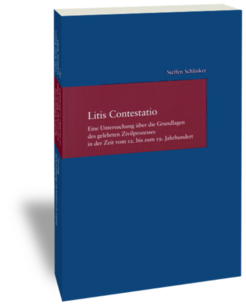Litis Contestatio
Eine Untersuchung über die Grundlagen des gelehrten Zivilprozesses in der Zeit vom 12. bis zum 19. Jahrhundert
[Litis Contestatio
Investigating the Basis of Scholarly Civil Trials from the 12th to the 19th Centuries]
Steffen Schlinker
Studien zur europäischen Rechtsgeschichte 233
Frankfurt am Main: Klostermann 2008. XIV, 699 p.
ISSN 1610-6040
ISBN 978-3-465-04054-5

Investigating the Basis of Scholarly Civil Trials from the 12th to the 19th Centuries
Steffen Schlinker
Studien zur europäischen Rechtsgeschichte 233
Frankfurt am Main: Klostermann 2008
The litis contestatio exemplifies the continuity of trial law over the last 2500 years. The term refers to a defendant’s agreement to have the case heard in court. Emerging originally in ancient Roman law, 12th and 13th-century jurists developed the litis contestatio into an indispensable formal act on which to base civil trials. This remained the case in the typical civil trials of the 19th century, while a duly processed subpoena was all that was required to initiate a civil trial according to the code of civil procedure. The study examines how the litis contestatio changed and its functions evolved, yielding insight into the concept, constitution and content of civil trials. The encounter with the Saxonian trial based on German legal views led to a new interpretation and reconceived functions of particular trial institutions, especially the litis contestatio. The study also considers subpoena procedures, the construction of default judgments, formulating the matter in dispute, the claim and the force of law as well as the substantive legal consequences of trial initiations and claim assignments.
